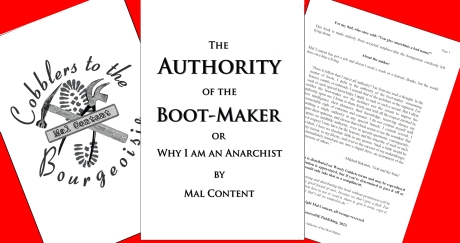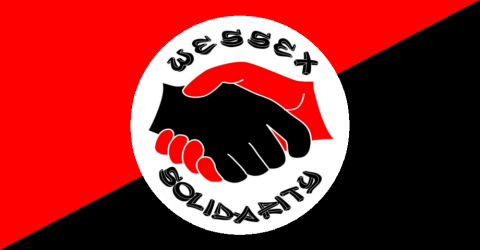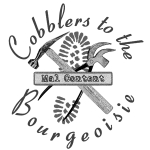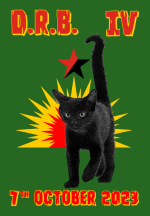
Monument to the miners at Enugu, Nigeria.
On the 18th November 1949, 21 striking miners and a bystander were shot dead at a British government-owned coal mine at Enugu, Nigeria; 51 were injured.
The miners were fighting for back-pay owed to them for a period of casualisation known as ‘rostering’, later declared illegal, and had been sacked following a work to rule. They occupied the mine to prevent a repeat of the lock-out they had suffered during the 1945 general strike. Because Enugu was home to the Zikist independence movement, which included Marxists and other radicals; police were sent to remove the mine’s explosives, accompanied by Hausa troops drafted in from the North of the country; whose language and even their uniforms were unfamiliar to the Igbo miners.
Local Igbo constables fraternised with the workers, they were sure the government would pay them what they were due; in return the miners assured them they did not want to fight. They would not obstruct the police from removing the explosives, but refused to help because it wasn’t their job. They had strict work demarcation imposed by the British, these were hewers and tubmen: “This job is for timbermen, some special labourers, he should call them.”
Nigerian Coal had been of strategic importance during the war, and continued to be vital in the re-building of infrastructure by the post-war Labour government, who sought to maximise output in the Sterling zone to pay off its debt to the U.S. Many of the men had served in the British armed forces, veterans of guerrilla warfare in Southeast Asia. In 1943 with inflation raging they had been called on to make up the shortfall in the British coalfields caused by the war. They were acutely aware they had saved Britain’s arse and been led to believe their sacrifices would create a better world, whilst their bosses were planning for a future that didn’t exist.
They used their regular income to develop their communities, establishing the self-help mechanisms once familiar to mining villages in Britain, which were the inspiration for the welfare state, with free hospitals and relief funds for injured workers and their dependants. The Enugu Colliers supported maternity clinics, road building and clean water supplies. Rejecting the British government’s mass literacy programme, designed to prepare their children for a life of menial labour, they created permanent, stone-built primary and secondary schools. These commitments were undermined by the economic uncertainty of rostering.
The aspirations of these workers collided with Labour’s reconstructive ambitions and its cold war paranoia, plus the racism of the colonial management, desperate to maintain their privileges. As they had done at home Labour wanted to integrate trade unions into the state, using them to contain and defuse class struggle. The Colonial Office recruited hundreds of T.U.C. bureaucrats and despatched them around the empire to institute modern industrial relations practices. In this they were thwarted by the colonial officials, who considered African workers unworthy of political representation. The Igbo themselves had no use for the concept, their culture of open assemblies and mass meetings lent itself to Syndicalism; judging union leaders simply on their ability to execute the will of the workforce. Their Zikist General Secretary, Okwudili (Isaiah) Ojiyi, used his detailed knowledge of colonial labour law and thorough understanding of its political context to run rings around the bosses. Because striking was illegal he imported the Durham miners’ ‘ca canny’ go-slow tactic, translated to ‘welu nwayo’ in Igbo and spent many days in the mines teaching it.
A T.U.C. advisor named Curry tried to insert a layer of bureaucracy between Ojiyi and the rank and file by splitting the union into five occupational branches, in violation of Igbo organisational principles. They therefore interpreted this as the creation of five autonomous unions, rendering the negotiating structure redundant. The hewers began a wildcat go-slow, were sacked and occupied the mine, followed by the tubmen.
The violence was initiated by a British policeman called Captain F.S. Phillip; terrified of Africans and fearful of communist subversion, he spoke neither Igbo nor Hausa. The miners had tied strips of red cloth to their helmets and clothing to show their solidarity; to Phillip these were paramilitary insignia. As was their custom, facing the mass of armed troops they began to dance and chant to keep up their spirits. Philip panicked and shot dead a young hewer named Sunday Anyasado who had recently married and moved to the area. He then killed a machine man, Livinus Okechukwuma. Hearing the noise, tubman Okafor Ageni ventured out of the mine asking “Anything wrong?” and was killed on the spot. The firing continued for several minutes, some miners were shot in the back. Blacksmith Emmanuel Okafor was shot six times while tending to the dying electrician Felix Nnaji. Dead and wounded alike were left where they lay. Okafor told Philip: “I surrender, take me to hospital”, Philip answered: “I don’t care” and walked away.
Those eighty-seven rounds sounded the doom of the British Empire; Labour’s strategies of using intermediaries to buffer class anger, and separating industrial disputes from their political context had blown up in its face. The ethnic, regional and even class divisions in Nigerian society were temporarily set aside, replaced by a collective momentum to do away with British rule.
“The radicals and the moderates, the revolutionaries and the stooges, the bourgeoisie and the workers, sank their differences, remembered the word Nigeria and rose in revolt against evil and inhumanity.”
– Nduka Eze
The following workers died at the scene or of their injuries, but many more were wounded:
Livinus Okechukwuma, Machine Man
Ngwu Nwafor, Tubman
Agu Ede, Machine Man
Okafor Ageni, Tubman
Thomas Chukwu, Machine Man
Jonathon Ezeani, Railman
Ani Amu, Hewer
Onoh Onyia, Tubman
Nnaji Nwachukwu, Screen Labourer
Simeon Nwachukwu, Machine Man
James Ekeowa, Clip Operator
Sunday Anyasado, Hewer
Felix Nnaji, Apprentice Electrician
Andrew Okonkwo, Hewer
William Nwehu, Engine Driver
Augustina Aniwoke, Hewer
Ogbonnia Chime, Machine Man
Moses Ikegbu, Machine Man
Nwachukwu Ugwu, Machine Man
Nduaguba Eze, Tubman
Ani, Hewer.
Taken from: ‘We Were All Slaves: African Miners, Culture, and Resistance at the Enugu Government Colliery, Nigeria.’
– Carolyn Brown Phd.
We are indebted to Dr Carolyn Brown, for information and sources.
Mal Content.
Further reading:
Syndicalist Workers’ Federation: How Labour Governed 1945-51
OWEI LAKEMFA: “One hundred years of trade unionism in Nigeria”
The link is to the first of five parts, dealing with the background to the 1945 General Strike, for the next part you have to click ‘previous article’ on the web page, and so on.
Bristol Radical History Group: Hidden histories of the British state revealed 2013
Carolyn Brown Phd: ‘We Were All Slaves: African Miners, Culture, and Resistance at the Enugu Government Colliery, Nigeria.’ Heinemann / James Currey.
‘Africa and World War II’ edited by Carolyn Brown, Judith Byfield, Tim Parsons, Ahmad Sikainga Cambridge University Press.
‘POWER AND NATIONALISM IN MODERN AFRICA: Essays in Honor of Don Ohadike.’ Edited by Toyin Falola and Salah M. Hassan, Durham, North Carolina: Carolina Academic Press, 2008.
Frederick Cooper: ‘Decolonization and African Society: the labour question in French and British Africa.’ (Cambridge 1996)
David Smock: Conflict and Control in an African Trade Union: A Study of the Nigerian Coal Miners’ Union.’ Stanford U: Hoover Institute Press, 1969
Agwu Akpala: ‘Background to the Enugu Colliery Shooting Incident in 1949’ – Journal of the Historical Society of Nigeria, 3,2 (1965) 335-64
Paul Kelemen: ‘Planning for Africa: The British Labour Party’s Colonial Development Policy, 1920-1964’, Journal of Agrarian Change, Vol 7, No. 1 (January 2007), pp. 76-98.
Jack Woodis: ‘The Mask is Off! An Examination of the Activities of Trade Union Advisers in the British Colonies.’ London: Thames Publications, 1954
November 9, 2015
Categories: Nigeria . Tags: International, Labour party, Occupy, Picket, Solidarity, workers . Author: wessexsolidarity . Comments: 2 Comments













